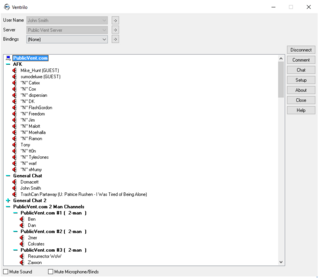A software development kit (SDK) is a collection of software development tools in one installable package. They facilitate the creation of applications by having a compiler, debugger and sometimes a software framework. They are normally specific to a hardware platform and operating system combination. To create applications with advanced functionalities such as advertisements, push notifications, etc; most application software developers use specific software development kits.

Quake 4 is a military science fiction first-person shooter video game developed by Raven Software and published by Activision. It is the fourth title in the Quake series and a sequel to Quake II. Raven Software collaborated with id Software, who supervised the development of the game as well as provided the id Tech 4 engine upon which it was built. The game has an increased emphasis on single-player gameplay compared to previous installments; its multiplayer mode does not support playable bots.
DirectPlay is part of Microsoft's DirectX API. It is a network communication library intended for computer game development, although it can be used for other purposes.

GameSpy was an American provider of online multiplayer and matchmaking middleware for video games founded in 1996 by Mark Surfas. After the release of a multiplayer server browser for the game, QSpy, Surfas licensed the software under the GameSpy brand to other video game publishers through a newly established company, GameSpy Industries, which also incorporated his Planet Network of video game news and information websites, and GameSpy.com.

TeamSpeak (TS) is a proprietary voice-over-Internet Protocol (VoIP) application for audio communication between users on a chat channel, much like a telephone conference call. Users typically use headphones with a microphone. The client software connects to a TeamSpeak server of the user's choice, from which the user may join chat channels.

Voice chat is telecommunication via voice over IP technologies—especially when those technologies are used among players in multiplayer online games.
NovaLogic, Inc. was a software developer and publisher established in 1985 and based in Calabasas, California. The company was founded by CEO John A. Garcia. Garcia's background in computer software started in Southern California in the early 1980s, when he worked at Datasoft. The company was known for their Voxel Space engine, which was utilized in franchises such as the Comanche and Delta Force series. In October 2016, NovaLogic's assets were bought out by THQ Nordic and is currently an inactive label for the company.

Ventrilo is a proprietary VoIP software that includes text chat.
XLink Kai is a program developed by Team XLink allowing for online play of video games with support for LAN multiplayer modes. It enables players on the GameCube, Nintendo Switch, PlayStation 2, PlayStation 3, PlayStation 4, PlayStation Portable, PlayStation Vita, Xbox, Xbox 360, and Xbox One to play games across the Internet using a network configuration that simulates a local area network (LAN). It notably also allows original Xbox games to be played online again following the Xbox Live shutdown on 21 April 2010 and certain GameSpy titles such as Saints Row 2 to be played online after the GameSpy network shutdown on 31 May 2014.

MSN Games is a casual gaming web site, with single player, multiplayer, PC download, and social casino video games. Games are available in free online, trial, and full feature pay-to-play versions.

Mplayer, referred to as Mplayer.com by 1998, was a free online PC gaming service and community that operated from late 1996 until early 2001. The service at its peak was host to a community of more than 20 million visitors each month and offered more than 100 games. Some of the more popular titles available were action games like Quake, Command & Conquer, and Rogue Spear, as well as classic card and board for more casual gamers. Servers and matchmaking was provided through a proprietary client. Initially, the service was subscription-based, but by early 1997, they became the first major multiplayer community to offer games to be played online through their network for free. This was done by relying on advertisement-based revenues.

Massive Incorporated was an American advertising company that provided software and services to dynamically host advertisements within video games. Massive Incorporated was purchased by Microsoft in May 2006 for approximately $200 million to $400 million.

The Dial-up Wide-Area Network Game Operation, better known by the acronym DWANGO, was an early online gaming service based in the United States. Launched in 1994, it was originally known for its compatibility with Doom, for which it functioned as a matchmaking service for online multiplayer. The service also supported various other titles, including other id Software games such as Doom II and Heretic as well as titles from other companies like Duke Nukem 3D, Blood, and Shadow Warrior from 3D Realms.
Games for Windows is a discontinued brand owned by Microsoft and introduced in 2006 to coincide with the release of the Windows Vista operating system. The brand itself represents a standardized technical certification program and online service for Windows games, bringing a measure of regulation to the PC game market in much the same way that console manufacturers regulate their platforms. The branding program was open to both first-party and third-party publishers.
A home server is a computing server located in a private computing residence providing services to other devices inside or outside the household through a home network or the Internet. Such services may include file and printer serving, media center serving, home automation control, web serving, web caching, file sharing and synchronization, video surveillance and digital video recorder, calendar and contact sharing and synchronization, account authentication, and backup services.
Online games are video games played over a computer network. The evolution of these games parallels the evolution of computers and computer networking, with new technologies improving the essential functionality needed for playing video games on a remote server. Many video games have an online component, allowing players to play against or cooperatively with players across a network around the world.

Kinect is a line of motion sensing input devices produced by Microsoft and first released in 2010. The devices generally contain RGB cameras, and infrared projectors and detectors that map depth through either structured light or time of flight calculations, which can in turn be used to perform real-time gesture recognition and body skeletal detection, among other capabilities. They also contain microphones that can be used for speech recognition and voice control.
GameSpy Technology, a division of Glu Mobile, was the developer of the GameSpy Technology product, a suite of middleware tools, software, and services for use in the video game industry.

Microsoft Flight is an amateur flight simulation from Microsoft Studios created as a spin-off of the Microsoft Flight Simulator series. The game is offered "free-to-play"; charging players for downloading extra content, aircraft or scenery.

In video games with online gaming functionality, also called cross-compatible play, cross-platform play, crossplay, or cross-play describes the ability of players using different video game hardware to play with each other simultaneously. It is commonly applied to the ability for players using a game on a specific video game console to play alongside a player on a different hardware platform such as another console or a computer. A related concept is cross-save, where the player's progress in a game is stored in separate servers, and can be continued in the game but on a different hardware platform.












